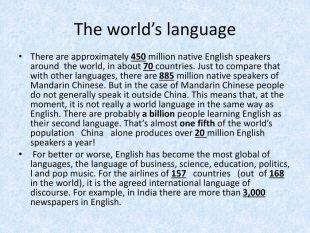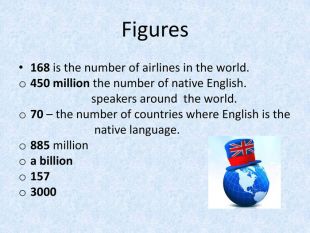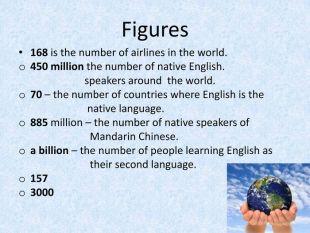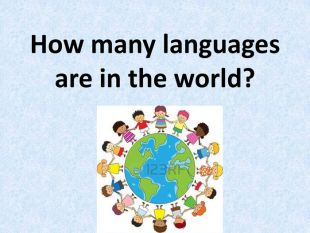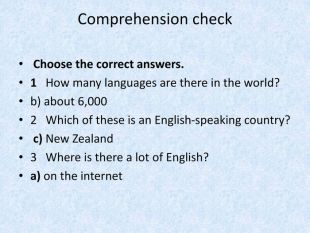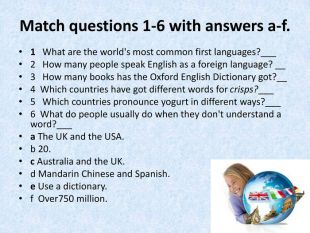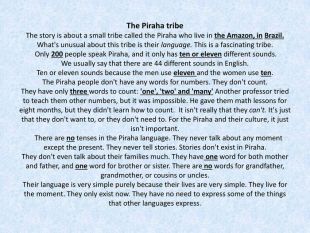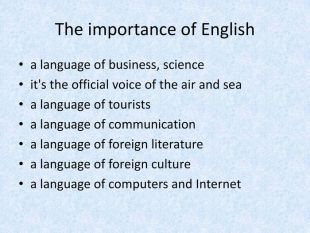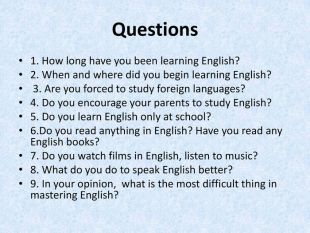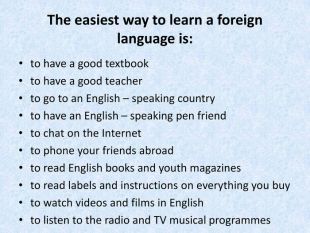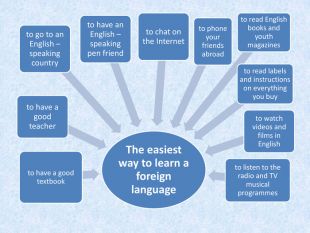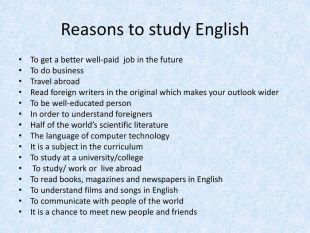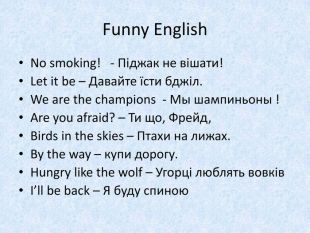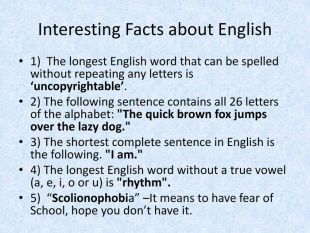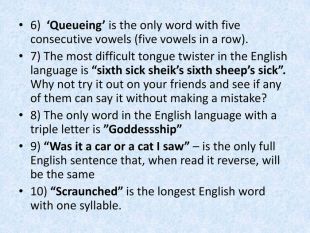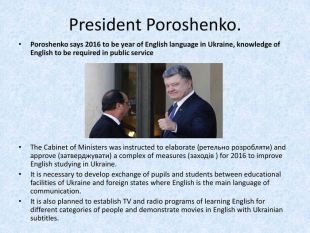презентація до уроку "English-a language of the world"






























Word stress and nationalities • Most nationalities end in -ian, e.g. Argentinian, Brazilian, Italian. • A lot of nationalities end in -ish, e.g. British, English, Irish, Scottish, Spanish. • A few nationalities end in -ese, e.g. Chinese, Portuguese, Japanese. The stress is always on the -ese sound. • There are also a few exceptions, e.g. French (from France), Welsh from Wales), Dutch (from the Netherlands), Arabic (from many Arabic countries).• The word for the language is often the same as for the nationality, i.e. German, Portuguese, Japanese, Spanish.
Pronunciation1 Brazil; Brazilian; Portuguese2 Austria; Austrian: German3 Wales: Welsh; Welsh4 Japan: Japanese: Japanese5 the Netherlands; Dutch; Dutch6 Egypt; Egyptian: Arabic7 Argentina; Argentinian; Spanish8 Poland; Polish; Polish9 Switzerland; Swiss; Romansh, Italian, German, French 10 Ukraine: Ukrainian, Ukrainian.
The world’s language. There are approximately 450 million native English speakers around the world, in about 70 countries. Just to compare that with other languages, there are 885 million native speakers of Mandarin Chinese. But in the case of Mandarin Chinese people do not generally speak it outside China. This means that, at the moment, it is not really a world language in the same way as English. There are probably a billion people learning English as their second language. That’s almost one fifth of the world’s population China alone produces over 20 million English speakers a year! For better or worse, English has become the most global of languages, the language of business, science, education, politics, l and pop music. For the airlines of 157 countries (out of 168 in the world), it is the agreed international language of discourse. For example, in India there are more than 3,000 newspapers in English.
Figures 168 is the number of airlines in the world.450 million the number of native English. speakers around the world.70 – the number of countries where English is the native language.885 million – the number of native speakers of Mandarin Chinese.a billion – the number of people learning English as their second language.1573000
Figures 168 is the number of airlines in the world.450 million the number of native English speakers around the world.70 – the number of countries where English is the native language.885 million – the number of native speakers of Mandarin Chinese.a billion – the number of people learning English as their second language.157 – the number of countries where English is the agreed international language of discourse.3000
Figures 168 is the number of airlines in the world.450 million the number of native English. speakers around the world.70 – the number of countries where English is the native language.885 million – the number of native speakers of Mandarin Chinese.a billion – the number of people learning English as their second language.157 – the number of countries where English is the agreed international language of discourse.3000 - the number of English newspapers in India.
Comprehension check Choose the correct answers.1 How many languages are there in the world?a) about 600 b) about 6,000 c) about 16,0002 Which of these is an English-speaking country? a) Thailand b) Austria c) New Zealand3 Where is there a lot of English?a) on the internet b) on the radio c) on TV
Match questions 1-6 with answers a-f.1 What are the world's most common first languages?___2 How many people speak English as a foreign language? __3 How many books has the Oxford English Dictionary got?__4 Which countries have got different words for crisps?___5 Which countries pronounce yogurt in different ways?___6 What do people usually do when they don't understand a word?___a The UK and the USA.b 20.c Australia and the UK.d Mandarin Chinese and Spanish.e Use a dictionary.f Over750 million.
Match questions 1-6 with answers a-f.1 What are the world's most common first languages? d. Mandarin Chinese and Spanish.2 How many people speak English as a foreign language? f. Over750 million.3 How many books has the Oxford English Dictionary got? b. 204 Which countries have got different words for crisps? a. The UK and the USA5 Which countries pronounce yogurt in different ways? c. Australia and the UK.6 What do people usually do when they don't understand a word? e. Use a dictionary.
The Piraha tribe. The story is about a small tribe called the Piraha who live in the Amazon, in Brazil. What's unusual about this tribe is their language. This is a fascinating tribe. Only 200 people speak Piraha, and it only has ten or eleven different sounds. We usually say that there are 44 different sounds in English. Ten or eleven sounds because the men use eleven and the women use ten. The Piraha people don't have any words for numbers. They don't count. They have only three words to count: 'one', 'two' and 'many' Another professor tried to teach them other numbers, but it was impossible. He gave them math lessons for eight months, but they didn't learn how to count. It isn't really that they can't. It's just that they don't want to, or they don't need to. For the Piraha and their culture, it just isn't important. There are no tenses in the Piraha language. They never talk about any moment except the present. They never tell stories. Stories don't exist in Piraha. They don't even talk about their families much. They have one word for both mother and father, and one word for brother or sister. There are no words for grandfather, grandmother, or cousins or uncles. Their language is very simple purely because their lives are very simple. They live for the moment. They only exist now. They have no need to express some of the things that other languages express.
Questions1. How long have you been learning English?2. When and where did you begin learning English? 3. Are you forced to study foreign languages?4. Do you encourage your parents to study English?5. Do you learn English only at school?6. Do you read anything in English? Have you read any English books?7. Do you watch films in English, listen to music?8. What do you do to speak English better? 9. In your opinion, what is the most difficult thing in mastering English?
The easiest way to learn a foreign language is: to have a good textbookto have a good teacherto go to an English – speaking countryto have an English – speaking pen friendto chat on the Internetto phone your friends abroadto read English books and youth magazinesto read labels and instructions on everything you buyto watch videos and films in Englishto listen to the radio and TV musical programmes
Reasons to study English. To get a better well-paid job in the future. To do business. Travel abroad. Read foreign writers in the original which makes your outlook wider. To be well-educated person. In order to understand foreigners. Half of the world’s scientific literature. The language of computer technology It is a subject in the curriculum. To study at a university/college To study/ work or live abroad To read books, magazines and newspapers in English. To understand films and songs in English. To communicate with people of the world. It is a chance to meet new people and friends
Funny English. No smoking! - Піджак не вішати!Let it be – Давайте їсти бджіл. We are the champions - Мы шампиньоны !Are you afraid? – Ти що, Фрейд,Birds in the skies – Птахи на лижах. By the way – купи дорогу. Hungry like the wolf – Угорці люблять вовків. I’ll be back – Я буду спиною
Interesting Facts about English 1) The longest English word that can be spelled without repeating any letters is ‘uncopyrightable’.2) The following sentence contains all 26 letters of the alphabet: "The quick brown fox jumps over the lazy dog."3) The shortest complete sentence in English is the following. "I am."4) The longest English word without a true vowel (a, e, i, o or u) is "rhythm".5) “Scolionophobia” –It means to have fear of School, hope you don’t have it.
6) ‘Queueing’ is the only word with five consecutive vowels (five vowels in a row). 7) The most difficult tongue twister in the English language is “sixth sick sheik’s sixth sheep’s sick”. Why not try it out on your friends and see if any of them can say it without making a mistake?8) The only word in the English language with a triple letter is ”Goddessship”9) “Was it a car or a cat I saw” – is the only full English sentence that, when read it reverse, will be the same10) “Scraunched” is the longest English word with one syllable.
President Poroshenko. Poroshenko says 2016 to be year of English language in Ukraine, knowledge of English to be required in public service. The Cabinet of Ministers was instructed to elaborate (ретельно розробляти) and approve (затверджувати) a complex of measures (заходів ) for 2016 to improve English studying in Ukraine. It is necessary to develop exchange of pupils and students between educational facilities of Ukraine and foreign states where English is the main language of communication. It is also planned to establish TV and radio programs of learning English for different categories of people and demonstrate movies in English with Ukrainian subtitles.
-
 Овчаренко Людмила Сергіївна 10.05.2023 в 18:13Загальна:5.0Структурованість5.0Оригінальність викладу5.0Відповідність темі5.0
Овчаренко Людмила Сергіївна 10.05.2023 в 18:13Загальна:5.0Структурованість5.0Оригінальність викладу5.0Відповідність темі5.0


про публікацію авторської розробки
Додати розробку






